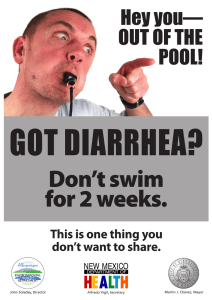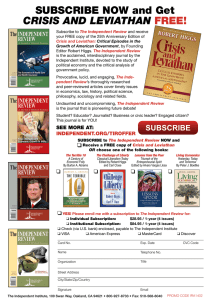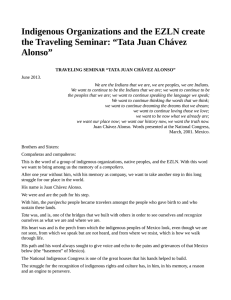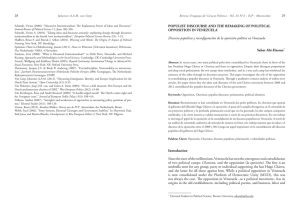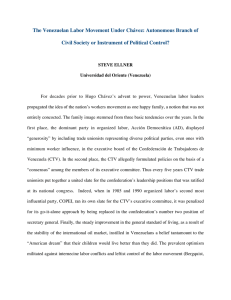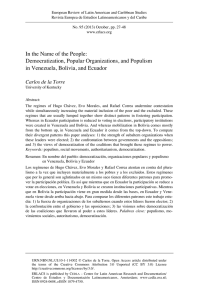The Illness of President Hugo Chávez Frías: Catalyst for Crisis or
Anuncio
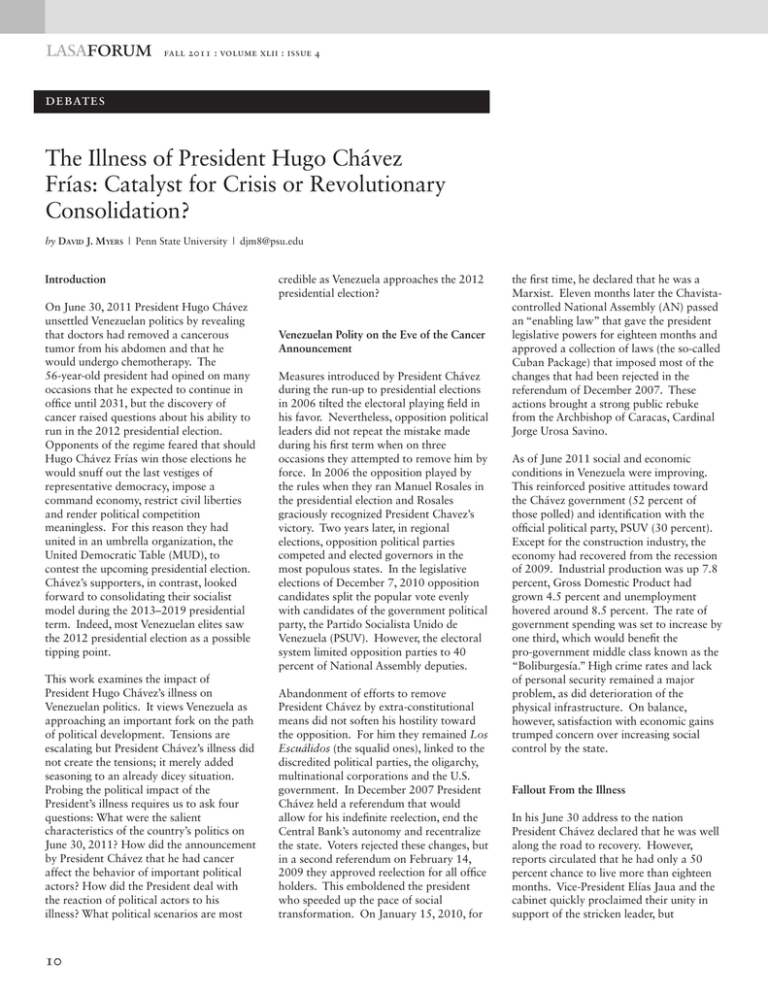
lasaforum fall 2011 : volume xlii : issue 4 debates The Illness of President Hugo Chávez Frías: Catalyst for Crisis or Revolutionary Consolidation? by David J. Myers | Penn State University | [email protected] Introduction On June 30, 2011 President Hugo Chávez unsettled Venezuelan politics by revealing that doctors had removed a cancerous tumor from his abdomen and that he would undergo chemotherapy. The 56-year-old president had opined on many occasions that he expected to continue in office until 2031, but the discovery of cancer raised questions about his ability to run in the 2012 presidential election. Opponents of the regime feared that should Hugo Chávez Frías win those elections he would snuff out the last vestiges of representative democracy, impose a command economy, restrict civil liberties and render political competition meaningless. For this reason they had united in an umbrella organization, the United Democratic Table (MUD), to contest the upcoming presidential election. Chávez’s supporters, in contrast, looked forward to consolidating their socialist model during the 2013–2019 presidential term. Indeed, most Venezuelan elites saw the 2012 presidential election as a possible tipping point. This work examines the impact of President Hugo Chávez’s illness on Venezuelan politics. It views Venezuela as approaching an important fork on the path of political development. Tensions are escalating but President Chávez’s illness did not create the tensions; it merely added seasoning to an already dicey situation. Probing the political impact of the President’s illness requires us to ask four questions: What were the salient characteristics of the country’s politics on June 30, 2011? How did the announcement by President Chávez that he had cancer affect the behavior of important political actors? How did the President deal with the reaction of political actors to his illness? What political scenarios are most 10 credible as Venezuela approaches the 2012 presidential election? Venezuelan Polity on the Eve of the Cancer Announcement Measures introduced by President Chávez during the run-up to presidential elections in 2006 tilted the electoral playing field in his favor. Nevertheless, opposition political leaders did not repeat the mistake made during his first term when on three occasions they attempted to remove him by force. In 2006 the opposition played by the rules when they ran Manuel Rosales in the presidential election and Rosales graciously recognized President Chavez’s victory. Two years later, in regional elections, opposition political parties competed and elected governors in the most populous states. In the legislative elections of December 7, 2010 opposition candidates split the popular vote evenly with candidates of the government political party, the Partido Socialista Unido de Venezuela (PSUV). However, the electoral system limited opposition parties to 40 percent of National Assembly deputies. Abandonment of efforts to remove President Chávez by extra-constitutional means did not soften his hostility toward the opposition. For him they remained Los Escuálidos (the squalid ones), linked to the discredited political parties, the oligarchy, multinational corporations and the U.S. government. In December 2007 President Chávez held a referendum that would allow for his indefinite reelection, end the Central Bank’s autonomy and recentralize the state. Voters rejected these changes, but in a second referendum on February 14, 2009 they approved reelection for all office holders. This emboldened the president who speeded up the pace of social transformation. On January 15, 2010, for the first time, he declared that he was a Marxist. Eleven months later the Chavistacontrolled National Assembly (AN) passed an “enabling law” that gave the president legislative powers for eighteen months and approved a collection of laws (the so-called Cuban Package) that imposed most of the changes that had been rejected in the referendum of December 2007. These actions brought a strong public rebuke from the Archbishop of Caracas, Cardinal Jorge Urosa Savino. As of June 2011 social and economic conditions in Venezuela were improving. This reinforced positive attitudes toward the Chávez government (52 percent of those polled) and identification with the official political party, PSUV (30 percent). Except for the construction industry, the economy had recovered from the recession of 2009. Industrial production was up 7.8 percent, Gross Domestic Product had grown 4.5 percent and unemployment hovered around 8.5 percent. The rate of government spending was set to increase by one third, which would benefit the pro-government middle class known as the “Boliburgesía.” High crime rates and lack of personal security remained a major problem, as did deterioration of the physical infrastructure. On balance, however, satisfaction with economic gains trumped concern over increasing social control by the state. Fallout From the Illness In his June 30 address to the nation President Chávez declared that he was well along the road to recovery. However, reports circulated that he had only a 50 percent chance to live more than eighteen months. Vice-President Elías Jaua and the cabinet quickly proclaimed their unity in support of the stricken leader, but uncertainty over the nature of Chávez’s illness sparked the fiercest conflict within his movement since it had taken power. Two important factions emerged. One centered on the military and the other included leftist civilians such as Foreign Minister Nicolas Maduro, Vice President Jaua and the President’s older brother, Adán Chávez. Diosdado Cabello and Jessie Chacón cast long shadows within the armed forces. They belonged to the President’s military cohort and acted as trusted lieutenants in the unsuccessful coup of February 4, 1992. Each received an important cabinet portfolio under President Chávez, but more recently they had devoted themselves to private economic activity and accumulated fortunes. Many active-duty military personnel are also rumored to have amassed personal wealth. These opportunities would vanish if the Chavista movement lost power. Like most of the President’s supporters his generals were not confident that Chavismo without Chávez could carry the day. News of the president’s cancer led the generals to begin laying the groundwork for justifying their refusal to accept defeat in the 2012 presidential elections. Militantly leftist Chavista civilian leaders made many of the same calculations as their military comrades. As early as June 27 Adán Chávez opined in the Venezuelan media that it would be “unforgivable” for the government “to limit itself only to electoral ways, and not to pursue other methods of struggle, including armed struggle,” to stay in power. This suggested that ideological and operational differences between the two factions of Chavismo were not great. The core conflict between them, and it should not be underestimated, was over control of the rent-dispensing state. Within the opposition, reaction was guarded to news of the president’s illness. In the first place, opposition leaders did not know how grave the illness was. Most believed that a life-threatening or incapacitating illness presented them with a golden opportunity to defeat the Chavistas in free elections. However, open rejoicing over the president’s predicament would appear to be in poor taste and likely self-defeating. Thus, opposition leaders attended public religious services in which Roman Catholic, evangelical and Santeria clergy offered prayers for the President and petitioned for his recovery. Those who planned to compete in the opposition primary elections scheduled for February 12 followed the lead of Henrique Capriles Radonski, the governor of Miranda State, who declared that he looked forward to campaigning against and defeating a healthy President Chávez in the 2012 presidential elections. Reasserting Control and Regaining Momentum Infighting among his supporters brought President Chávez back to Caracas on July 4, earlier than planned. In a meeting with visiting heads of state the following evening and by appearing at Fort Tiuna (the most important military base in Caracas) on the morning of July 7 President Chávez proclaimed that he remained in control. During an early morning jog with cadets at Fort Tiuma their comandante told reporters that never again would the opposition govern the fatherland. On that afternoon the President convened a cabinet meeting during which he confirmed the portfolios of all incumbents and added a new Minister of Youth (Mari Pili Hernández). The following week, in a highly publicized telephone call to educators at the headquarters of the National Bolivarian University, President Chávez concluded with the boast that “the transition that is coming is to socialism.” In subsequent television appearances he displayed his fiery rhetoric by calling the opposition MUD a “nest of serpents and snakes.” On July 17, as he departed for Havana to begin a new round of chemotherapy, President Chávez boasted that he would rise “like a phoenix.” He appeared satisfied that he had succeeded in restoring the political situation to what it was prior to the announcement of his illness. Chávez returned to Caracas on July 23 and remained in Venezuela until September 17, when he again journeyed to Cuba for a fourth (and final?) round of chemotherapy. Soon after his return he announced that he would run for reelection as president. A flood of press releases from the President’s office followed, highlighting the Comandante’s determination to fight for his people while defeating the disease that had invaded his body. However, he no longer appeared on television for hours at a time, as he had in the past. When he did appear in public he emphasized the themes that marked his discourse since 2007: the importance of completing the transition to Twenty-First Century socialism, the corruption of the oligarchy and their “squalid” minions and the dangers posed by the United States. Opposition leaders responded to the President’s improving health and efforts to accelerate the Bolivarian Revolution by resuming preparations to fight what they viewed as an epic battle for survival. More opposition politicians announced their intention to run in the February opposition primary elections while promising to campaign for the victor in the general election. As of late September, Henrique Capriles Radonsky (Governor of the state of Miranda) and Pablo Pérez (Governor of 11 lasaforum fall 2011 : volume xlii : issue 4 the state of Zulia) had established themselves as first-tier candidates. The former appealed mainly to interests that in the previous regime had backed the Social Christian party (COPEI). The latter drew support from groups once associated with Acción Democrática, the social democratic party. The chronology of confrontation gelled in mid-September, when the National Electoral Council scheduled the presidential election for October 7, 2012 and the regional elections for governor and state legislatures for December. In a brazen challenge to the government, the MUD petitioned the National Assembly to pass a transition law, arguing that it was necessary because the government would surely lose the election. President Chávez called the petition “a bad joke.” To summarize, as of late September 2011 the political ground in Venezuela lay much as it had in early June, prior to the cancer surgery. In addition, President Chávez had announced that he would run for a third term and half of all Venezuelans viewed his government favorably. The Comandante appeared capable of waging a vigorous reelection campaign although doubts persisted. The position of the opposition was not hopeless. It was better organized than at any time since the national elections of 1998. Nevertheless, President Chávez stood an excellent chance of winning a third term. This would devastate the opposition’s ability to prevent him from dismantling the last vestiges of representative democracy. Health, Still the Wild Card The “Chávez Recovery Scenario” discussed above assumes that the President will be able to conduct a credible reelection campaign. However, should the return of 12 cancer incapacitate him two other scenarios will come into play. In the first, the President’s older brother Adán or Foreign Minister Nicolas Maduro would step forward. In consultation with the Castro brothers—who have much to lose if the opposition wins the 2012 presidential election—Chávez nominates either Adán or Maduro as the government’s presidential candidate. The former has been the President’s top liaison with Cuba’s regime. He is currently governor of the Chávez family’s native Barinas state and is part of the Chavismo’s radical leftist, pro-Cuban wing. Nicolas Maduro is close to the President, charismatic and more popular with the inner circle than Adán. Both have indicated that they would go beyond “electoral ways” to insure that the revolution remained in power. The second scenario revolves about a military-supported “Boliburgesía” candidate. It would come to pass should a fierce power struggle erupt within the president’s inner circle. To prevent chaos, Venezuela’s military hierarchy would persuade the president to appoint former Vice President Diosdado Cabello—Chávez’s all-purpose aide—as the government’s presidential candidate. This would appeal to top military officers who have become multimillionaires but do not support a Cuban-style communist model. Also, the military fears that radical civilians in the inner circle would replace the armed forces with Cuban-styled semi-independent territorial militias. In the final analysis the generals would support Cabello because they believe he would lead a crony capitalist government without abandoning Chávez’s radical leftist rhetoric. President Chávez would likely prefer the first alternative although he might opt for the second if he believed that only the armed forces could maintain order and preserve the revolution. Regardless, it is clear that the return of the President’s cancer would destabilize Venezuela, transform Chavismo and open the door to victory by the opposition in the 2012 presidential election. The scenario in which President Chávez is capable of conducting a credible reelection campaign appears more probable. n
